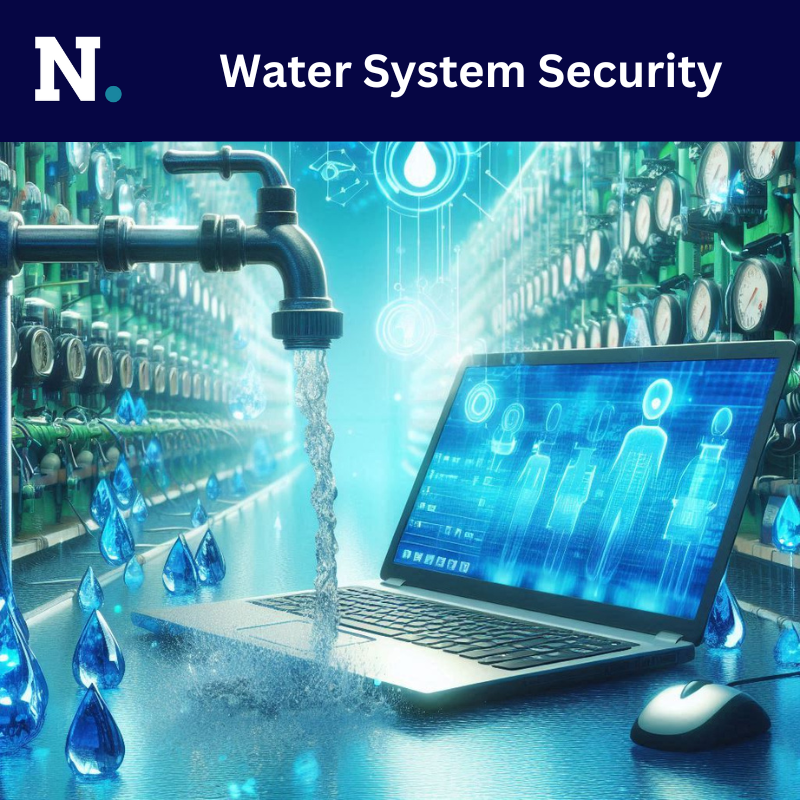Water systems are vital for public health. When they are disrupted, it can prevent communities from accessing safe drinking water or, worse, allow dangerous chemicals or contaminants to enter the water supply. Water supply attacks are often carried out by hackers with the aim of either causing widespread disruption or gaining political leverage.
In a letter written by the Assistant to the President for National Security Affairs, it was stated that affiliates of the Iranian Revolutionary Guards and the Volt Typhoon Cyber Group, sponsored by the People’s Republic of China, have carried out malicious cyberattacks against U.S. water supply systems.
The letter highlights a growing concern that could potentially become a reality.
In light of this warning, it is crucial to understand the risks associated with this issue.
What is a Water Supply Attack?
A water supply attack refers to the disruption or manipulation of the systems that control the flow, treatment, and distribution of water. These attacks usually target the infrastructure responsible for providing clean and safe drinking water to homes, businesses, and communities. This infrastructure includes treatment plants, pumping stations, and the software systems that control water distribution.
How Do Water Supply Attacks Happen?
Water supply systems today rely heavily on digital technology. Most water utilities use computerized systems to manage everything from water treatment to delivery. While this technology makes water distribution more efficient, it also creates vulnerabilities. Hackers can exploit weaknesses in these systems to gain control of key operations, causing serious consequences.
Cyber Infiltration
Hackers often begin by accessing a water system’s control network through weak security points. Many water systems are outdated and may not have the latest cybersecurity protections. If hackers find an opening, they can enter the system and tamper with controls. One of the most common entry points is through weak passwords or systems that haven’t been updated to fix known security issues.
Once inside the system, hackers can disrupt operations in several ways:
- Shutting Down Pumps: Hackers can turn off water pumps, stopping the flow of water. This can prevent entire communities from receiving clean water.
- Altering Chemical Levels: In water treatment plants, chemicals like chlorine are used to purify water. Hackers can alter these chemical levels, making the water unsafe to drink. An example of this occurred in 2021, when hackers attempted to raise the levels of sodium hydroxide (a toxic substance) in the water supply of Oldsmar, Florida, but were thwarted before causing harm. Had the attack been successful, it could have endangered thousands of lives.
- Blocking Distribution: Hackers can disable or redirect the flow of water to create a shortage in certain areas, leaving people without access to clean water.
Targeting Software and IT Systems
Water systems rely on industrial control software, like SCADA (Supervisory Control and Data Acquisition) systems, which monitor and manage different aspects of water distribution. If hackers breach these systems, they can gain direct control over valves, pumps, and other critical infrastructure. Attacks on these control systems are particularly dangerous because they can lead to real-time changes that affect water supply quality and safety.
Read More: Cyberattack Catastrophe: How Hackers Can Endanger Human Lives ?
Some hacker groups, such as those linked to governments, are known to conduct reconnaissance missions where they breach these systems but do not immediately cause damage. Instead, they gather information and position themselves for future attacks.
Vulnerabilities in Water Systems
Water supply systems face several challenges that make them attractive targets for cyberattacks. Many of these systems are old, with outdated technology, limited resources, and insufficient funding to properly secure their operations. This makes it easier for hackers to exploit vulnerabilities.
Outdated Technology
Many water systems rely on older technology that has not kept up with modern cybersecurity standards. In some cases, these systems still use default passwords or have not been updated to fix known security vulnerabilities. This allows hackers to easily gain access to these systems.
Insufficient Funding
Most water utilities operate with limited budgets. Because of this, they often struggle to implement the latest security measures. Funding cuts mean there is less money available for upgrading equipment, hiring cybersecurity experts, or investing in robust defenses.
Staffing Shortages
Another major issue is the lack of skilled personnel available to manage and protect water systems. Many utilities are understaffed and may not have employees with the knowledge or expertise needed to defend against cyberattacks. This increases the likelihood that vulnerabilities will go unnoticed or unaddressed.
Weak Security Practices
In some cases, even basic cybersecurity measures, like changing default passwords or installing software updates, are not followed. This can leave the system vulnerable to attacks that could easily have been prevented with proper precautions. Simple mistakes, like failing to update security software, can be the difference between a functioning water system and a system that falls victim to hackers.
Real-Life Examples of Water Supply Attacks
Water supply attacks are not just theoretical; they have occurred in various parts of the world and have highlighted how dangerous these breaches can be.
Targeted Attacks on the U.S.
The Biden administration recently warned states of ongoing cyberattacks against U.S. water systems. Hackers linked to foreign governments, including those from Iran and China, have been attempting to compromise water infrastructure in the United States. These attackers are looking for weak points they can exploit, with the goal of either causing immediate harm or positioning themselves for future disruptions.
The Environmental Protection Agency (EPA) noted that these cyberattacks have the potential to disrupt the lifeline of clean drinking water. This could result in severe consequences for affected communities, including significant financial costs and public health risks.
Israeli Water System Attack
In one instance, an Iranian-backed hacking group targeted digital controls used in water and wastewater industries across several states. Although this attack did not interfere with water quality or supplies, it exposed the vulnerabilities in U.S. water systems and raised concerns about the lack of safeguards in place to protect critical infrastructure.
Global Threats
Water systems around the world are vulnerable to cyberattacks. In some cases, hackers have targeted water treatment plants to alter chemical levels in the water. If successful, these attacks could introduce harmful substances into the water supply, making it unsafe for consumption. Other incidents have involved shutting down water services, leaving communities without access to clean water for extended periods.
Why Are Water Supply Attacks So Dangerous?
Water is a basic necessity for life, and any disruption to its supply can have serious consequences for public health, safety, and daily living. Water is a necessity and any changes to the water purification or supply can result in loss of human lives.
Power Grids at Risk: Cyber Attacks
Health Risks
If hackers are able to manipulate the chemical levels in water treatment plants, they can introduce harmful chemicals or allow dangerous pathogens to contaminate the water. This can lead to waterborne illnesses, poisoning, or long-term health issues for the population.
Economic Impact
Water supply attacks can also have significant financial consequences. Communities may need to spend large amounts of money to repair damaged infrastructure, clean up contaminated water supplies, or provide alternative water sources to affected areas. These costs can be particularly burdensome for smaller towns and cities that may not have the financial resources to recover quickly.
Public Panic
In addition to the direct health and economic impacts, water supply attacks can create widespread panic. If people believe their water is unsafe, it can lead to mass hysteria, hoarding, and a loss of confidence in public services. This makes it even more important to ensure that water systems are adequately protected from potential attacks.
In conclusion, water supply attacks are a growing threat that can have devastating effects on public health and safety. With hackers actively targeting vulnerable water systems, it is crucial for governments and utility companies to take the necessary steps to secure this vital infrastructure and prevent future incidents.





